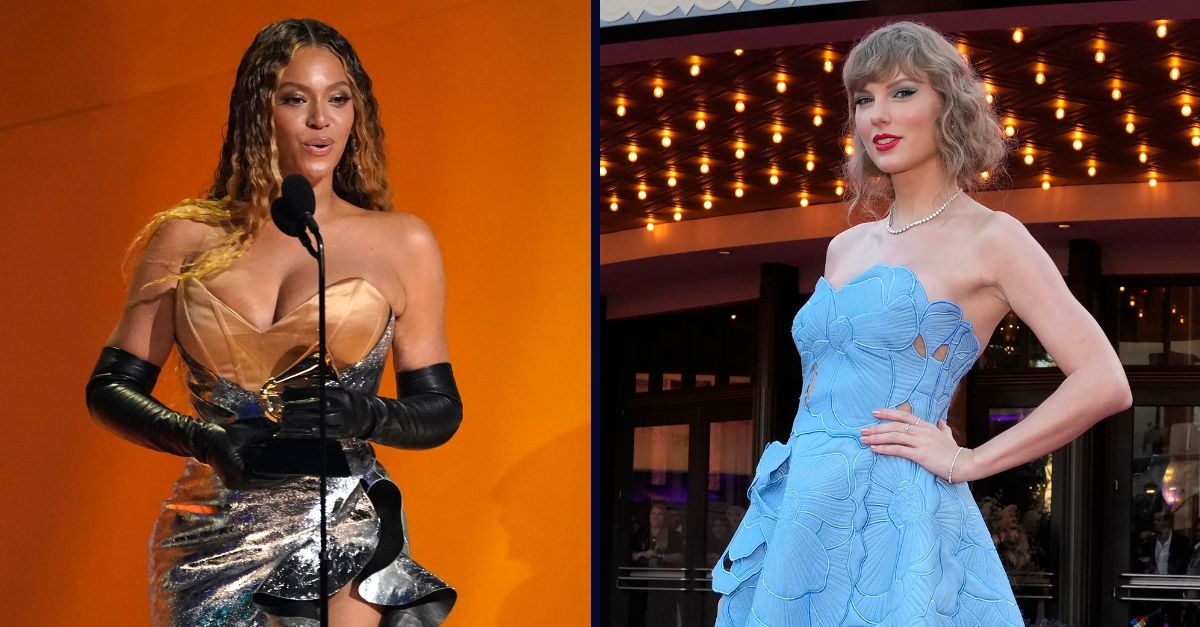
Left: Beyonce accepts the award for best dance/electronic music album for “Renaissance” at the 65th annual Grammy Awards on Sunday, Feb. 5, 2023, in Los Angeles (AP Photo/Chris Pizzello). Right: Taylor Swift arrives at the world premiere of the concert film “Taylor Swift: The Eras Tour” on Wednesday, Oct. 11, 2023, at AMC The Grove 14 in Los Angeles (AP Photo/Chris Pizzello).
Who would have guessed that October 13, 2023, would have ended up becoming a date that would stick out in the minds of a variety of people — whether you’re a member of the “Beyhive” and/or a “Swiftie,” an antitrust lawyer, or head of a major movie studio?
This date marked the premiere of “Taylor Swift: The Eras Tour,” a film documenting Swift’s massively successful tour which she embarked on earlier this year. The film was widely acclaimed by critics and surpassed the $100 million mark in global ticket presales alone, and it’s on track to becoming the highest-grossing concert film of all time.
While many are lauding the film, others have noted the uniqueness of the deal Swift and her contemporaries — like Beyonce, whose upcoming concert film for her recent Renaissance World Tour is set for a December release — have struck. Both artists have partnered with the movie theater chain AMC for their respective films, without any involvement from major film studios like Paramount Pictures, 20th Century Studios, or Universal Pictures. While this move has evoked ire from many film studios who have been cut out by the process, many in the legal community are paying close attention, as evolving antitrust laws which made this deal possible continue to change as time goes on.
In 1948, the Supreme Court issued its decision in United States v. Paramount Pictures, a major case which changed the way Hollywood films were created, distributed, and premiered. Up until that point, major film studios owned the theaters where their films were shown and therefore only showed the films they made, excluding countless others and those who worked so hard on them. Eventually, the U.S. District Court for the Southern District of New York issued a consent decree in 1940 with numerous restrictions, including the requirement that “blind buying” — the practice of theater districts purchasing films without viewing them beforehand — would be prohibited and replaced with special screenings showing films to the theater districts prior, and implementing an administration board to enforce this.
In 1948, the Supreme Court upheld that consent decree, essentially creating the Paramount Decrees, enforced by the U.S. Department of Justice. This cemented a practice that remained as the guiding precedent for the film industry for over half a century. By August 2020, however, the DOJ announced that the federal court in New York, at the DOJ’s request, was terminating the Paramount Decrees for a variety of reasons. First, many of the studios that signed the decrees were no longer in operation, as the so-called “Big Five” studios that reigned during Hollywood’s “Golden Age” — such as RKO Pictures and Metro-Goldwyn-Mayer — were either defunct or declining. Second, striking the consent decree made space for other business models, such as streaming platforms, to stake a claim in premiering such films.
When Swift chose to bypass the traditional funneling of a major film studio to distribute her movie, reports indicated studios were angry at being excluded, yet it was clear AMC reaped the benefits, with AMC theaters breaking their record for the most single-day ticket sales, selling $26 million in just three hours.
So what does this change in law mean for artists and studios alike? For musicians like Swift and Beyonce, it enables them to bypass the need to negotiate with individual theaters and just transact business with AMC, which allows for a more streamlined and efficient process. For their fans, it allows them to be able to financially afford to go see their films, as studios were not able to mandate a theater to abide by price points, but Swift was able to set the specific price of $19.89 per ticket — an apparent reference to her “1989” album.
That is sure to be a relief for Swift’s fans, who sued Ticketmaster for fraud and antitrust violations, claiming the platform engaged in price fixing and heavily monopolizing this part of the market, as countless concert tickets were snatched up and re-sold for prices as immense as $13,000. This change in law also enables the artists to take home a larger chunk of the pie; since Swift’s family reportedly financed the entire film themselves, they are set to receive 57% of the film’s gross revenue. For film studios, the reported reaction is expected – the fact that major theater chains are able to find premium programming without their help makes it clear the studios are likely to see a decline in their participation and profit from these kinds of deals.
It is clear that the way people are consuming content has changed rapidly in the past several years – the increasing rise in streaming platforms, the COVID-19 pandemic, and people’s overall mounting preference for watching films in the comfort of their own home, made many believe the role of the theater and going to the movies was a thing of the past. Yet this past summer, the simultaneous release of “Barbie” and “Oppenheimer” (infamously dubbed “Barbenheimer”) reinvigorated the experience of going to the theater for countless moviegoers.
And now, thanks to these critical shifts in antitrust laws, the way Beyonce and Swift’s concert films are being released is set to mark a major change in the film industry, with future artists likely to follow their predecessors’ lead.
Like all of Swift’s dedicated followers, we will be watching.
Have a tip we should know? [email protected]

